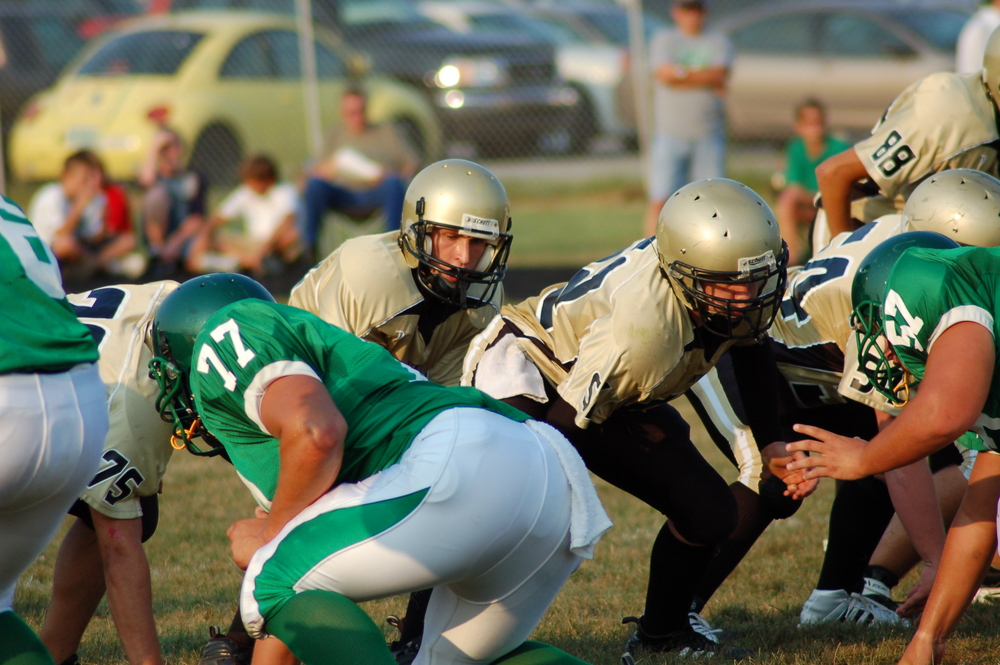Jul 27, 2016Gridiron Gains
In the high school ranks, football players are often looking to gain weight. The keys are to eat throughout the day with a heightened focus on the period of time right after practice. Here’s a look at one athlete’s plan for boosting lean mass.
Calvin was not unlike many high school football players — he wanted desperately to get bigger and stronger. By the time I started working with him at the beginning of his junior year, he had been trying to gain weight for six months, spurred into action by college coaches who encouraged him to put on 15 to 20 pounds. Despite lifting three mornings a week, diligently consuming protein before and after workouts, and eating as much as possible, his weight would not budge from a slender 160 pounds. At 6 feet tall, his lean mass was 147 pounds, fat mass was 13 pounds, and body composition was eight percent body fat.

To get a clearer idea of what was causing these problems, I had Calvin write down what he ate. Upon reading Calvin’s eating log, I could immediately see some problems with his total calorie and macronutrient intake. For starters, he was consuming roughly 3,600 calories a day, with most of them coming at lunch and dinner. Based on his body type, level of training, and desire to build lean mass, he needed between 4,500 and 5,000 calories per day to gain weight at a healthy rate of one to two pounds per week.
On the flip side, by eating roughly 250 grams of protein per day, Calvin was consuming well above his recommended intake of 160 grams (based on one gram per pound of bodyweight per day). Although he was doing a great job getting protein during the day as well as before and after workouts, focusing too much on this macronutrient meant he was neglecting needed carbohydrate calories.
I estimated Calvin should be consuming at least four grams of carbohydrate per pound per day, or 640 grams. However, based on his daily eating log, he was coming in at approximately 425 grams of carbohydrate per day — well short of his recommended intake. Without enough carbs, it would be difficult for Calvin’s body to utilize protein for muscle gains.
To better address all of his dietary needs, Calvin and I came up with a new food plan. It prioritized fueling evenly throughout the day and refueling after workouts, both of which put Calvin in the best possible position to optimize muscle energy and gain lean mass. To further balance out his energy levels, I boosted his high-carb options at breakfast and before and after workouts. In addition, I included a high-protein snack before bed.
Here’s what a sample day looked like under Calvin’s new performance plan:
- Breakfast/Pre-lift: Bowl of cereal with milk, 16 ounces of orange juice, and half a protein shake (600 calories)
- Post-lift: Peanut butter sandwich, 16 ounces of grape juice, and half a protein shake (700 calories)
- Lunch: Six-inch turkey sub with cheese, bag of pretzels, two bananas, and two 20-ounce bottles of sports drink (1,000 calories)
- Pre-practice snack: Trail mix bar and 16 ounces of apple juice (400 calories)
- During practice: Two 20-ounce bottles of sports drink with two salt packets (260 calories)
- Post-practice: 20 ounces of chocolate milk (400 calories)
- Dinner: Six ounces of lean sirloin or pork loin, side of potatoes, side salad with half an avocado, one bowl of fruit salad, and 16 ounces of orange juice (1,000 calories)
- Snack: Smoothie with Greek yogurt and frozen fruit and a couple of cookies (500 calories).
In total, this new menu had Calvin eating about 4,800 to 5,000 calories per day. His protein intake was 200 grams, and he was consuming about 700 grams of carbs daily.
After sticking with the plan for a few weeks, Calvin started to see results. He felt more energetic and performed better at practice. And to top it all off, he was finally able to achieve his goal of gaining weight. Within eight weeks, he had put on 10 pounds and continues to add more.
Susan Kundrat, MS, RD, CSSD, LDN, is a Clinical Associate Professor of Kinesiology and the Nutritional Sciences Program Director at the University of Wisconsin-Milwaukee.



